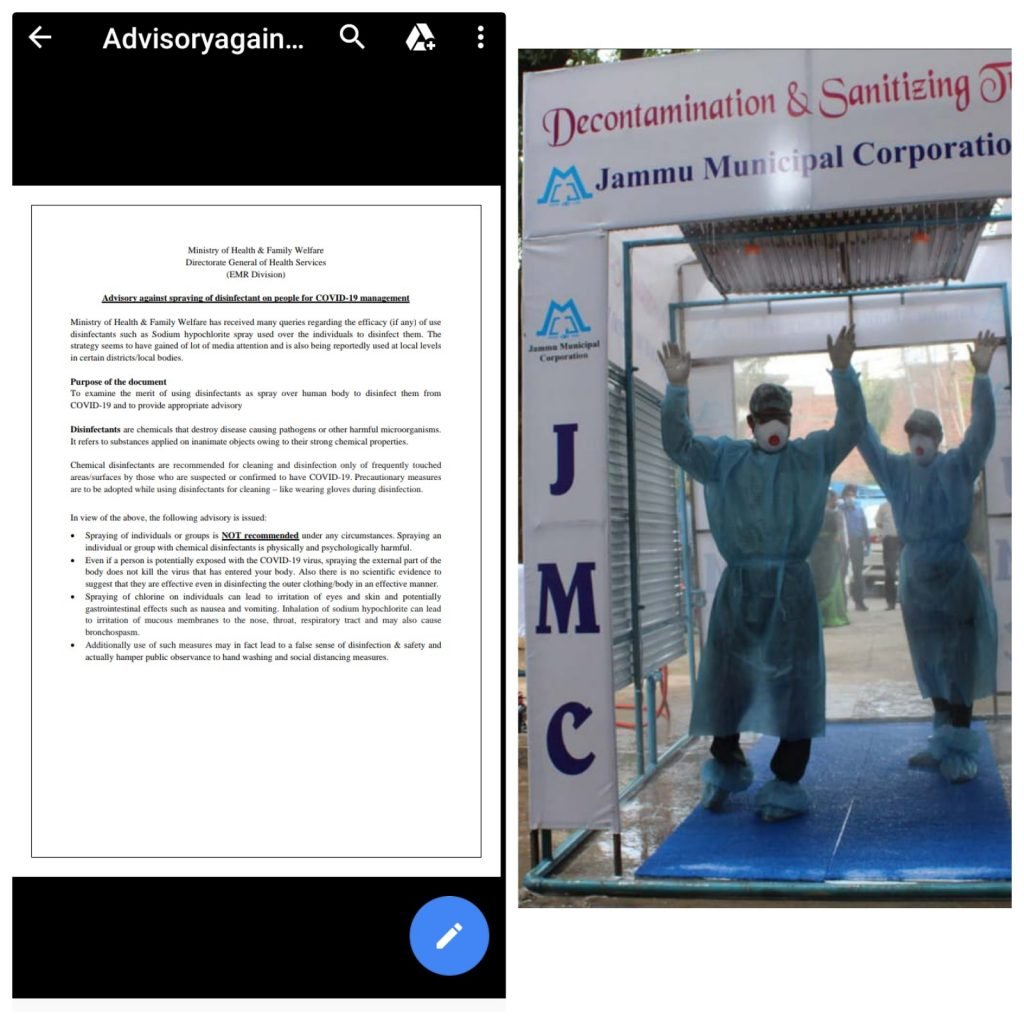Arfat Khan
JAMMU: Lacking any government advisory and proof of its proven efficacy from credible research institutions, the government departments in haste recklessly spending much needed ‘Disaster Management Funds’ on installation of unscientific decontamination tunnels in the state which spray disinfectant on people to ‘sanitize’ them from deadly Noval corona virus (nCoV).
This move is also mind blowing as it gain sudden momentum in the state when head of several states which includes Punjab, Tamil Nadu, Kerala had already banned use of these unscientific tunnels after the concerned health departments pointed out lethal adverse effects of disinfectant on human beings.
Ironically, though no one Jammu and Kashmir UT officially ready to speak on this vague development fearing victimization which has become a trend in the country but preferring anonymity termed these decontamination tunnels as sheer wastage of state exchequer which holds potential to harm human beings and distract the public in large from hygiene etiquettes and hand washing which has been recognized globally as the only credible way to fight nCoV.
Health experts says that such tunnels may also give people a false sense of security and they may avoid practising social distancing etiquettes and washing hands which is propagated vigorously by PM Narinder Modi as part of national campaign to defeat nCoV and thus ending inflicting more damage than good to the society in this grave time.
Till date there is no advisory issued by Ministry of Health and Family Welfare (MoHFW), National Centre for Disease Control (NCDC) and World Health Organisation suggesting or supporting use of disinfectants as spray on human beings in decontamination tunnels to fight nCoV.
Describing the decontamination tunnels as patently absurd, senior scientist posted in Regional Research Laboratory, Canal Road on condition of anonymity said “Knowingly that it lacks gross scientific basis, the local administration in various districts is still in mad race to set up decontamination tunnels”
This estrange move is good to be crowned as ‘Corona Warriors’ but the idea of spraying disinfectants on people to kill nCoV is not only eccentric but utterly illogical, he asserts.
Sodium Hypochlorite (NaOCL) and Quaternary Ammonium Compund (QAC) worldwide used as disinfectant for external purpose by hospitals, hotels, restaurants, industrial units etc to sanitise their surroundings but no global health institutions or agency has ever recommended its use on human beings in decontamination tunnels or for external purpose to fight nCoV, said another scientist of RRL.
Elaborating the harmful effects of NaOCL and QAC disinfectant on human beings, another health expert from the premier Government Medical College preferring anonymity said “Exposure of human beings to such disinfectants over a period of time can cause serious skin diseases, asthama, ENT disorder, burning of eyes including blindness”.
The environmental engineer has also raised concern over chemical laden waste water discharge on daily basis through these decontamination tunnels which if not disposed off scientifically may lead to environmental pollution and fatal injury to stray animals.
Responding to the JKGN query on email pertaining to issuance of any advisory from authorised government institutions regarding use of disinfectant like NaOCL or QAC as spray on human beings in decontamination tunnels, the MoHFW as well as NCDC denies having issued any such advisory.
Even, while recommending use of NaOCL in controlled way only for sanitisation purpose on surface, the WHO has cautioned use of any disinfectant on human beings citing serious health hazardous.
Senior doctor in the Govt Medical College preferring anonymity said “Decontamination tunnels won’t benefit asymptomatic or symptomatic COVID-19 positive people and they will remain infectious even after passing through the tunnel”.
Fighting corona virus, the officers should not fall prey to vague ideas. This is an extra ordinary situation which warrants judicious use of resources by shifting focus on building non-contact throat swab collection booths, intubation boxes and PPEG kits which have proven scientific advantages, said an IAS officer preferring anonymity.

